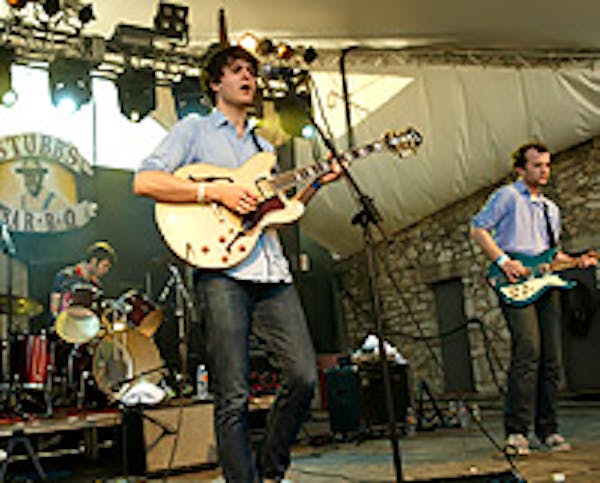This time last year, the fellas in Vampire Weekend had already started to feel the buzz. They were being touted by influential music websites and courted by record companies. Success was just one Louis Vuitton or Benetton lyrical reference away.
Only one thing stood in their way: Bassist Chris Baio still had to graduate from Columbia University, where the band had formed only a year earlier.
"We were meeting with labels while I was still a senior and still writing papers and all that," Baio recalled, calling from a tour van last week as Vampire Weekend traveled from San Francisco to Portland, Ore. "On some level, it was harder to concentrate, but I liked the things I was studying in college, so it wasn't too hard."
"And who knows," he added, "maybe eventually when the band goes to Russia, I can use my degree in Russian regional studies."
Such has been the whirlwind for Vampire Weekend: Last March they were Ivy League college boys with a little band on the side; this March they appeared on "Saturday Night Live" and the cover of Spin magazine as "the best new band of the year -- already?!"
Headed to the Triple Rock for their Minneapolis debut Thursday -- a show that sold out a month ago -- the New York-based, Afropop-inspired indie-rockers are still on the upside of a wave of hype that started with raves from music bloggers and Brooklyn hipsters.
Vampire Weekend's rapid ascent is a true sign of the times. Music's online revolution makes it possible for an instantaneous international buzz, even before there's a record out. VW's self-titled CD just came out a month ago on XL Recordings.
"We managed to make a lot of headway without a label," Baio marveled. "We did everything ourselves for a very long time. We didn't even have a manager until, like, December of last year."
Quick breakouts such as VW's, however, often lead to even hastier waves of skepticism and backlash. Bands such as Clap Your Hands Say Yeah and Minneapolis' own Tapes 'N Tapes earned similar, blogger-buoyed excitement only to produce ho-hum record sales in the end.
Predictably, the Vampire boys are trying to brush off any negative reaction to their fast rise.
"There gets to be this sort of meta-analysis where, as soon as a band gets popular, the idea of a backlash is the first thing that comes up," Baio said. "As far as an actual form of it, we haven't seen anything other than people writing nasty, anonymous things online, but they've been doing that since last April.
"In a way, you can even consider it a privilege to have people out there hating on you. It means your music's getting out there."
The music in this case actually is getting out beyond the blogosphere. Radio stations such as the Current (89.3 FM) are spinning the infectiously bouncy single "A-Punk" as well as "Cape Cod Kwassa Kwassa," the song with the fashion-designer references and a line about copulating to Peter Gabriel. The album, meanwhile, has already sold more than 100,000 copies since its release (impressive nowadays), and it's consistently among the hot sellers on iTunes.
Both "A-Punk" and "Cape Cod Kwassa Kwassa" demonstrate the band's unique mix of typical dorm-room, book-wormy rock -- the Smiths are an obvious influence -- with something atypical: African music. The band half-jokingly describes its sound as "Upper West Side Soweto," referencing both their Manhattan roots and a South African musical hotbed.
Baio credited singer-guitarist Ezra Koening and keyboardist Rostam Batmanglij (both music majors at Columbia) for bringing the African sounds into the band -- particularly soukous music, one of the styles made famous in the West via Paul Simon's "Graceland" album.
"When we formed the band, Ezra was listening to a compilation of Madagascar guitar pop music called 'Madagascar Guitar Vol. 2,'" he said. "At the same time, Rostam was listening to [South African singer] Brenda Fassie a lot. As far as our sound goes, it started with Ezra's guitar playing, and particularly the inspiration came from the guitar tone. We would feed off that."
Of course, referencing African music while wearing V-neck sweaters and singing about dorm-room parties and vacationing on Cape Cod has spawned its own bit of skepticism over the group. Baio laughed off that criticism, too.
"I'll be honest: Three-quarters of the band has never actually been to Cape Cod, just Ezra," he said. "We are who we are. If you look at a lot of rock bands that people enjoy, plenty of them are people with college degrees. I don't think there's any correlation between what kind of education you got and whether or not you're a good musician."
Baio was upfront that the band still has plenty to learn, too. When he heard that his interviewer saw the band perform at Spin magazine's party during the South by Southwest Music Conference two weeks ago (hmmm, first they're on the cover, then they're booked at the party), he quickly conceded it was a lackluster performance.
"We did a sound check in the morning, and then right before we went onstage, every single setting got erased" from the soundboard, he explained.
Inexperience also was one reason Vampire Weekend decided to stick with smaller, quickly-sold-out venues such as the Triple Rock on its current tour -- but it wasn't the main reason.
"We'll definitely be back in Minneapolis playing a bigger venue before the next record's out," Baio promised, "but playing smaller venues makes sense now. It says something when you go into a town and play a smaller place first. It makes it seem like you earned it more when you take a step up."
Oh, so now the band decides to take it a little slow.
Chris Riemenschneider • 612-673-4658

Minnesota Sports Hall of Fame: A class-by-class list of all members

This retired journalist changed professional wrestling from Mankato

